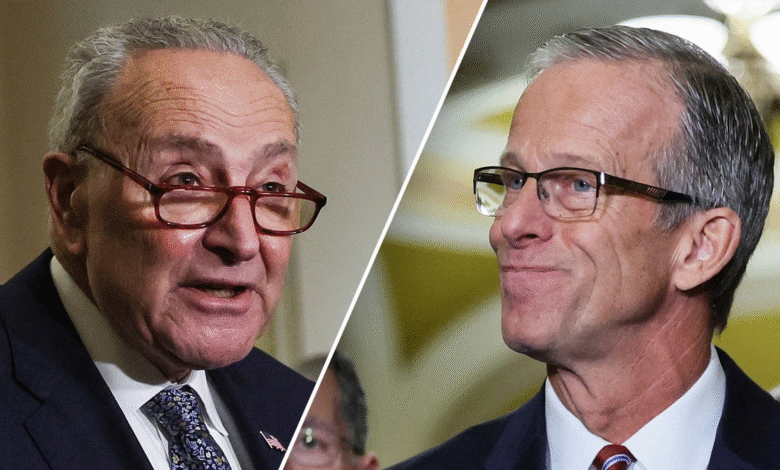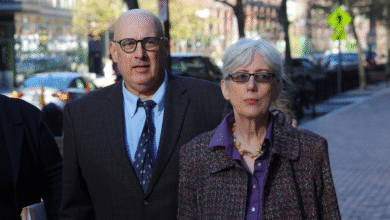Chuck Schumer DOJ Nominees Blocked Over Qatari Jet

In a bold political move, Chuck Schumer has announced his intention to block Trump DOJ nominees in response to the controversial acceptance of a luxury Qatari jet by President Donald Trump. The Senate Minority Leader articulated deep concerns over the implications of accepting the $400 million aircraft, arguing that it presents not only ethical dilemmas under the Emoluments Clause but also raises national security threats. Schumer is calling for Attorney General Pam Bondi to testify in Congress to explain how this gift from a foreign state aligns with constitutional law. This decision reflects Schumer’s stance against what he describes as blatant corruption, shining a light on the ethical complexities surrounding political nominations in the current administration. As the situation unfolds, the ramifications of Schumer’s actions on the progress of DOJ nominations will be closely monitored, particularly in a politically charged environment.
The discourse surrounding Chuck Schumer’s decision to impede political nominations within the Department of Justice highlights a significant tension in American politics. By challenging the legitimacy of Trump’s acceptance of the lavish Qatari jet, Schumer elevates the debate about foreign influence in government, particularly regarding the sensitive nature of emoluments and gifts from foreign entities. This escalation reflects broader concerns about the integrity of political appointments in the face of potential conflicts of interest. The discussions surrounding this issue not only delve into legal interpretations of the Emoluments Clause but also evoke questions about the broader implications for national security and governance. In this context, Chuck Schumer’s actions serve as a pivotal point in the ongoing examination of political ethics and accountability in the current administration.
Chuck Schumer’s Response to Trump DOJ Nominees
Senator Chuck Schumer’s decision to block political nominations at the Department of Justice stems from his strong opposition to President Trump’s acceptance of a luxury jet from Qatar. Schumer articulated his concerns on the Senate floor, labeling the action as a blatant attempt at corruption that could jeopardize national security. He insists that the offer of the private jet is not merely a harmless gift but raises serious legal questions, particularly under the Emoluments Clause, which prohibits presidents from receiving foreign gifts without congressional consent. Schumer’s bold move highlights his dedication to upholding the integrity of political nominations in the face of perceived wrongdoing.
The implications of Schumer’s hold on the DOJ nominees extend beyond the immediate political landscape. As the Senate’s Minority Leader, Schumer’s strategy aims to draw national attention to potential conflicts of interest associated with Trump’s acceptance of foreign gifts, particularly amid ongoing debates about ethics in the Trump administration. His call for Attorney General Pam Bondi to testify underscores the necessity for transparency and accountability in government dealings, especially concerning issues that touch upon international relations and national security.
The Legal Ramifications of the Qatari Jet Controversy
The controversy surrounding Trump’s acceptance of the Qatari jet raises significant legal questions regarding the Emoluments Clause of the Constitution. This clause serves as a safeguard against foreign influence on American leaders, and Schumer’s insistence on clarity from the Department of Justice indicates that he views the jet as a potential infringement on these constitutional protections. The requirement for congressional consent for gifts from foreign states highlights the delicate balance of power that exists within American government, emphasizing the importance of oversight in political appointments and actions.
Critics, including Schumer, argue that allowing Trump to accept such a lavish gift not only sets a dangerous precedent but also compromises U.S. security interests. By accepting a private jet that could be exploited for espionage, Trump risks placing the nation in a vulnerable position—one that may favor foreign adversaries over American interests. Republican Senator Ted Cruz has publicly supported these concerns, reiterating the risks of espionage associated with accepting such gifts. The ongoing dialogue about this situation raises essential questions about ethics and the responsibilities of public officials in their dealings with foreign entities.
Impact on Political Nominations Amidst Controversy
Schumer’s actions to halt political nominations serve as a tactical maneuver to leverage public disapproval towards Trump’s handling of foreign relations. Despite the Republican majority in the Senate, Schumer’s strategy could delay the confirmation process for upcoming DOJ nominees as discussions surrounding the Qatari jet controversy unfold. Some influential voices within the Republican Party have echoed Schumer’s concerns, indicating a rare bipartisan acknowledgement of the potential implications of this controversy, which could ultimately shape the future of political nominations.
The impact of this standoff may not only delay the necessary confirmations but could also lead to increased scrutiny of nominees. With Schumer’s hold in place, the administration may find it challenging to move forward with appointments without first addressing the underlying ethical concerns raised by Schumer’s protest. As the situation develops, both sides of the aisle will closely watch the administration’s response and the potential ramifications it could have on trust in the political process.
Ethics and Accountability in Political Appointments
Schumer’s demand for accountability from Attorney General Pam Bondi reflects broader concerns regarding ethics in political appointments. The ongoing discussions about the legitimacy of Trump’s acceptance of a luxury jet have opened up a crucial dialogue about the responsibilities of officials in the executive branch. In this context, the need for transparency is paramount, as voters expect public officials to act in the best interests of the nation, free from conflicts of interest that could compromise their integrity.
As political nominations become entwined with ethical scrutiny, the process often raises questions about the qualifications of nominees and whether they possess the necessary integrity to serve. Schumer’s hold is emblematic of a growing call for accountability in political appointments, suggesting that the public demands a higher standard for those tasked with upholding justice and the law. This ongoing discourse could reshape future nomination practices and encourage more rigorous evaluations of candidates’ backgrounds and affiliations.
Bipartisan Concerns Over Trump’s Foreign Relations
Interestingly, Schumer’s protest against Trump has garnered some unexpected bipartisan support, reflecting a shared concern among lawmakers regarding the implications of the proposed Qatari jet. Republican Senator Ted Cruz’s statements about the national security risks involved in accepting such a gift hint at a growing unease around Trump’s foreign relations, which could mobilize more voices across the aisle to demand reform and oversight. Bipartisan discourse surrounding Trump’s actions highlights a critical juncture wherein both parties may need to collaborate to safeguard national interests.
This unity against some aspects of Trump’s foreign policy demonstrates that issues around ethics and security do not solely belong to one political faction. As scrutiny increases, it may foster a more cooperative environment for future discussions on national security and foreign relations, compelling parties to prioritize the well-being of the nation over party alignment. The potential for bipartisan solutions could ultimately pave the way for a healthier political climate in which ethics in governance take precedence.
The Role of the DOJ in Upholding Constitutional Values
The role of the Department of Justice is pivotal when it comes to upholding constitutional values and maintaining the rule of law. Schumer’s insistence on halting nominations until the issues surrounding the Qatari jet are resolved places additional accountability onto the DOJ to clarify its stance regarding the Emoluments Clause and the implications of foreign gifts. With rising tensions over ethical decision-making at the highest levels of government, the DOJ’s response is crucial in reassuring the public that justice prevails over political favoritism.
Ensuring that the DOJ remains a bastion for constitutional integrity becomes vital especially during political controversies. The department’s ability to navigate the challenging landscape of political nominations in the wake of Schumer’s protest illustrates the delicate balance required to uphold the law while addressing the demands of contemporary governance. A commitment to transparency within the DOJ can help bolster public trust and ensure that upholding the Constitution remains a non-partisan priority, regardless of the shifting political waters.
Trump’s Justifications and Public Perception
Amidst the controversy, President Trump has characterized the Qatari offer of a luxury jet as a benign gesture, asserting that it was meant to serve as Air Force One in a temporary capacity. This public justification, however, has been met with skepticism from various corners, including some members of his own party. Trump’s framing of the situation attempts to downplay the ethical complexities introduced by foreign gifts, but it continues to ignite debates about the propriety of accepting such offerings amid security concerns and domestic opposition.
The public’s perception of Trump’s rationale is essential in understanding the broader implications of his actions. The skepticism expressed by both Schumer and leaders across the political spectrum emphasizes concerns about the integrity of the presidency and the potential erosion of ethical standards in governance. As discussions surrounding this issue unfold, Trump’s justifications may face increasing scrutiny from constituents, which could impact future political capital and the administration’s ability to navigate ethical challenges.
Calls for Reform in Political Nominations
The controversy surrounding the luxury jet has spurred discussions on the need for reform in how political nominations are handled in light of ethical dilemmas. Many lawmakers, inspired by Schumer’s hold on DOJ nominations, advocate for clearer guidelines that govern the acceptance of foreign gifts, especially those with implications for national security. By addressing these issues proactively, Congress has an opportunity to restore public trust and reestablish standards that prioritize integrity in the political sphere.
Schumer’s tactics serve as a reminder that political accountability is necessary when it comes to nominations that could affect the rule of law. As pressures mount for meaningful reform, both political parties may need to engage in a cooperative dialogue aimed at strengthening existing laws surrounding emoluments and foreign gifts. A commitment to reform in political nominations could be an essential step toward ensuring that America’s leadership operates with transparency and ethical responsibility.
Future Implications of the Qatari Jet Controversy
The future implications of the Qatari jet controversy extend beyond the immediate realm of political nominations; they may also shape public sentiment regarding governance and accountability. As Schumer continues to press for clarity and oversight, the outcome of this situation could set precedents that define how future foreign engagements are treated within the scope of U.S. politics. It could also invigorate movements advocating for electoral reforms that further prioritize ethical behavior among candidates and public officials.
Furthermore, as public discourse evolves around the legitimacy and ethics of Trump’s acceptance of the jet, lawmakers may find themselves compelled to revisit existing legislation pertaining to foreign gifts and political appointments. Enhanced scrutiny from both the public and fellow lawmakers could lead to reforms that serve to protect America’s democratic institutions from foreign influence, thereby helping maintain robust checks on executive power in a globalized political environment.
Frequently Asked Questions
Why is Chuck Schumer blocking Trump’s DOJ nominees over the Qatari jet controversy?
Chuck Schumer is blocking Trump’s Department of Justice nominees in response to President Trump’s intention to accept a $400 million luxury jet from Qatar. Schumer argues that this move raises serious ethical and national security concerns, potentially violating the Emoluments Clause of the Constitution.
What are the implications of Chuck Schumer’s hold on Trump DOJ nominees?
By placing a hold on Trump’s DOJ nominees, Chuck Schumer aims to bring attention to the ethical issues surrounding the Qatari jet controversy. This action may delay the confirmation process, prompting a broader discussion on corruption and national security involving political nominations.
How does the Emoluments Clause relate to Chuck Schumer’s statements on Trump DOJ nominees?
Chuck Schumer’s statements regarding Trump DOJ nominees hinge on the Emoluments Clause, which prohibits presidents from accepting gifts from foreign states without congressional approval. Schumer is demanding clarity from Attorney General Pam Bondi on why the proposed acceptance of the Qatari jet would not breach this clause.
What reactions did Chuck Schumer’s announcement regarding Trump DOJ nominees provoke?
Chuck Schumer’s announcement to block Trump’s DOJ nominees has sparked reactions from both Democrats and some Republicans, highlighting bipartisan concerns about the legality and ethics of Trump’s acceptance of the Qatari jet, along with its implications for national security.
What did Chuck Schumer specifically demand from Attorney General Pam Bondi regarding Trump DOJ nominees?
Chuck Schumer demanded that Attorney General Pam Bondi testify before Congress to explain why accepting a $400 million jet from Qatar does not violate the Emoluments Clause, which he argues is essential before proceeding with Trump’s DOJ nominees.
| Key Point | Description |
|---|---|
| Chuck Schumer’s Announcement | Senator Chuck Schumer has announced a hold on Trump’s DOJ nominees in response to the proposal of accepting a luxury jet from Qatar. |
| Qatar’s Jet Offering | President Trump referred to the $400 million 747 jet offered by Qatar as a ‘very nice gesture’ to be used similar to Air Force One. |
| Emoluments Clause Concern | Schumer demanded Attorney General Pam Bondi to explain whether accepting the jet violates the Emoluments Clause of the Constitution. |
| National Security Impacts | Critics, including Senator Ted Cruz, raised concerns about potential espionage and surveillance risks related to the acceptance of the jet. |
| Response from Trump | Trump expressed disappointment over Boeing’s delay in constructing a new Air Force One, defending the Qatari jet as a practical option. |
| Political Dynamics | Despite Schumer’s hold, the Republican majority in the Senate may proceed with the nominations, highlighting the political tension. |
Summary
Chuck Schumer DOJ Nominees are currently facing delays due to Senator Chuck Schumer’s protest against President Trump’s plan to accept a luxury jet from Qatar. This situation encapsulates the intersection of legal, ethical, and national security concerns that surround Trump’s administration. Schumer’s call for further clarification on the legality of this gift under the Emoluments Clause reflects deep divisions in political opinion on the matter. As this unfolds, the implications for both the DOJ’s nominations and broader political discourse may be significant.




